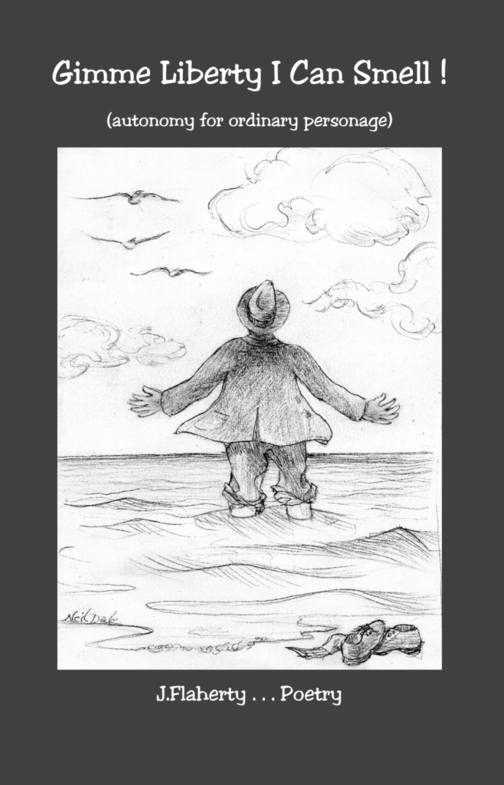In Gimme Liberty I Can Smell! (autonomy for ordinary personage), poet J. Flaherty kicks down the doors of poetical convention and rattles off a diatribe of thoughtful verse and bold demands that is difficult to put down.
A self-professed neobeat poet, there are certainly jazzy echoes of Kerouac and Corso in this collection, with urban references wildly blended with classical mythos, juxtaposing intensity and some timeless goofiness. While the topics of the poetry vary greatly, the voice is clear and consistent – he is a bold observer keeping his eyes peeled for the mystery and beauty of the world. Loosely centered on ideas of true liberty and personal revelation as a means to escape deeply rooted systems of thought, this isn’t always a light read, but the poet is playful and mischievous, managing to never go too long without eliciting a smile.
Flaherty cuts straight to the point, and his poetry is not deeply buried in tangled metaphors and subtle suggestions. This accessibility is reminiscent of his Beat Generation brethren, who often discussed the hardest and most universal elements of existence in simple terms and plain speech, disjointed and tangential as it may have been. Blending snatches of religiosity with the verbiage of revolt and resistance, there is a growing momentum within this collection, as each new poem sharpens Flaherty’s larger message.
Some poems are long, sprawling screeds, while others are succinct pockets of musing, no more than a handful of lines, that will draw you back over and over. In “Gimme Jimi,” Flaherty laments for the rebellious heroes of the past, even those that failed: Gimme the unknown soldier / lying in satisfaction these many / years, believing he sacrificed / his life for a noble cause, and / henceforth, can do no harm.
In “When the Moon Strikes Me,” the meter-free lines are nearly prose, capturing a brief snapshot of interaction, a tiny moment of wisdom that becomes fodder for self-reflection: We can’t change the world / but the leery make their way through it. There is tongue-in-cheek humor and real moments of profound soapboxing on these pages, encouraging readers to wake up, pay attention to the world around them, question everything, and reminisce on the freedom of youth.
While Flaherty’s poetry is immediate and uncomplicated, there is also a heavy-handedness to certain topics. The value and beauty of poetry often lies in its ability to obfuscate intense meaning, to dilute the impact of heavy topics and make the message more palatable. The blatantly literal poetry found here, some of which does read closer to prose than verse, may be too on the nose for some readers, particularly those who enjoy the esoteric madness of modern poets who weild a clever, socially critical pen. Flaherty doesn’t play at being overly academic, but for a poet who boldly eschews traditional form and meter, his word use could be both elevated and distilled into tighter verse.
That aside, this distinctly American collection is awash in nostalgia and longing, hard realities and speaking truth to power. J. Flaherty sees no subject as taboo, nor any aspect of life unconnected to his clarion call for liberty and personal awareness, which is inspiring both as poetry and as a call to action.
Book Links
STAR RATING
Design
Content
Editing
Get an Editorial Review | Get Amazon Sales & Reviews | Get Edited | Get Beta Readers | Enter the SPR Book Awards | Other Marketing Services
























Leave A Comment